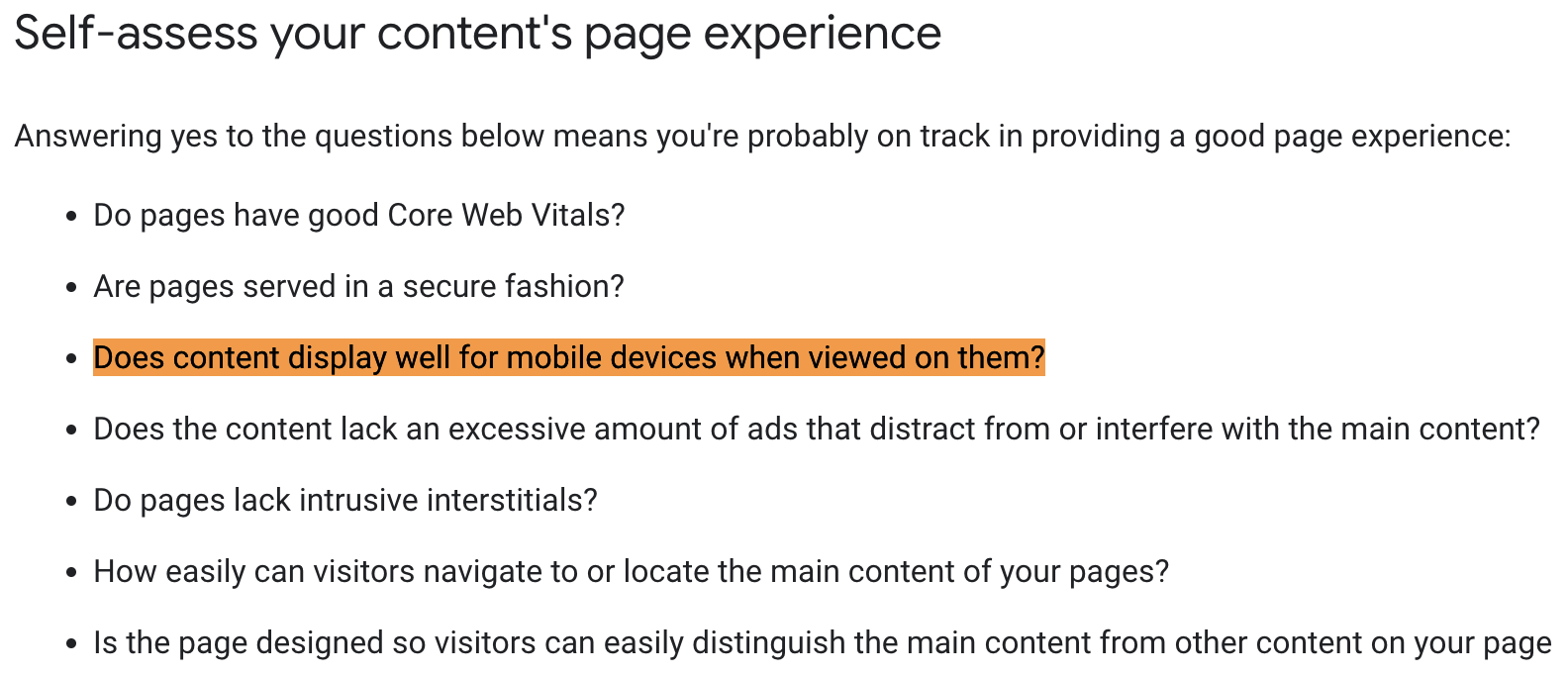For years, many in the SEO industry operated under the assumption that making a website mobile-friendly would boost search rankings.
However, a recent clarification from Google indicates that while mobile-friendliness is still recommended, it impacts search rankings differently than previously thought.
Google has reiterated that no single “page experience” ranking factor like mobile-friendliness determines search rankings alone.
While site speed and Core Web Vitals align with search success, relevance, and intent remain the most important.
This article covers the history of Google’s “mobile-friendly” updates, examines previous claims about mobile-friendliness as a ranking factor, and objectively analyzes its current role based on Google’s latest guidance.
[Recommended Read] → Ranking Factors: Systems, Signals, and Page Experience
The Previous Claims About Mobile-Friendliness
In the past, many experts believed mobile-optimized sites had a clear ranking advantage over desktop-only sites.
This was based on Google’s mobile-friendly update in 2015 that aimed to boost such pages in search results. The rationale was to provide users with the best experience as more people searched on phones.
Google even adopted mobile-first indexing, using only the mobile version of pages for crawling and ranking.
So mobile-friendliness was a confirmed ranking factor.
However, recent clarification from Google has led us to reassess this verdict.
Google’s Updated Guidance
Google says no single “page experience” ranking factor like mobile-friendliness determines rankings alone.
Instead, Google’s algorithm utilizes ranking “systems” that look at various signals.
Google’s de-emphasis on mobile-friendliness as a ranking system was apparent when it removed mentions of page experience and mobile-friendliness from its confirmed ranking systems list.
These technical elements remain part of Google’s ranking algorithms. This is a mostly semantic and organizational shift that clarifies how these signals are used to approximate a good page experience for users.
This is evident because Google highlights that content should display well for mobile devices in its criteria for self-assessing page experience:
 Screenshot from developers.google.com August 2023
Screenshot from developers.google.com August 2023Additionally, Google’s Search Liaison clarified that it’s vital to consider aspects of page experience, including mobile-friendliness, when optimizing websites for search.
“It does not say page experience is somehow “retired” or that people should ignore things like Core Web Vitals or being mobile-friendly.
The opposite. It says if you want to be successful with the core ranking systems of Google Search, consider these and other aspects of page experience.”
While mobile-friendliness aligns with search success, it’s part of a larger system and doesn’t necessarily move the needle by itself.
Google asks businesses and SEO professionals to focus on the meaning and value of pages beyond format and layout factors.
Google Search Advocate John Mueller said as much when addressing the removal of the page experience ranking signal:
“We’ve seen people hyper-focus on these numbers, that’s not a good use of time & energy. Think holistically instead.”
Ranking Systems Vs. Signals
Explaining the difference between ranking systems and signals, Google’s Search Liaison states:
“Ranking systems are different than ranking signals (systems typically make use of signals). We had some things listed on that page relating to page experience as “systems” that were actually signals.
They shouldn’t have been on the page about systems. Taking them off didn’t mean we no longer consider aspects of page experience. It just meant these weren’t ranking systems but instead signals used by other systems.”
[Ranking Factors 2023] Download the free ebook + cheat sheet →
Yes, Mobile-Friendliness Is Still A Ranking Factor

While having a mobile-optimized site remains recommended, it’s part of a broader page experience evaluation and not a system on its own.
As Google’s algorithms evolve, they improve at evaluating pages based on meaning, value, and experience. Not every element of page experience is considered by algorithms at all times, but they’re all important.
That means improving mobile usability alone isn’t a secret sauce on its own, but you should still ensure your site works well on mobile.
Focus on delivering value through helpful content as well as page experience, and search results will follow.




![[SEO, PPC & Attribution] Unlocking The Power Of Offline Marketing In A Digital World](https://www.searchenginejournal.com/wp-content/uploads/2025/03/sidebar1x-534.png)